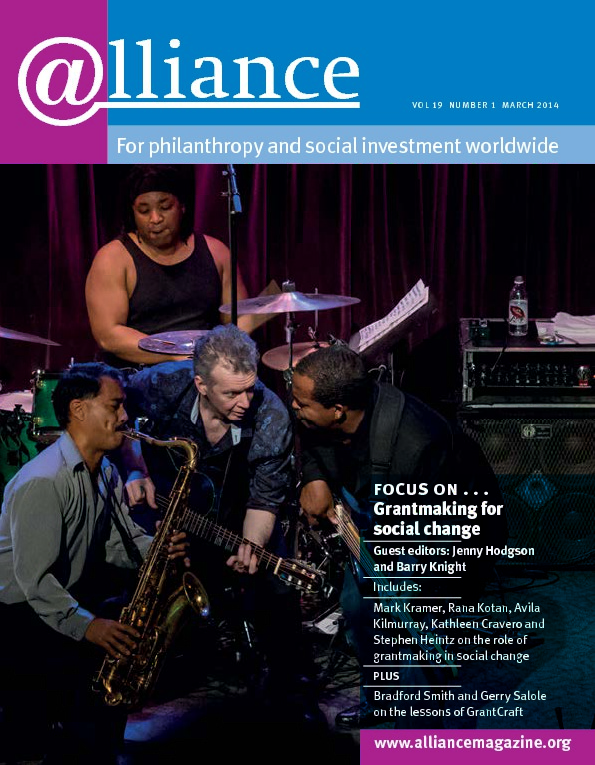Why don’t Latin Americans make donations? After all, the continent now has a large formal civil society and its wealth has increased. The answer is partly to be found in the history of a region that has always looked to its hierarchies for the solutions to its problems – the old hierarchies have been superseded but hierarchies remain, even if they now comprise corporations rather than ecclesiastics or statesmen – and partly in an abiding distrust for civil society organizations (CSOs).
Each of the region’s 21 countries has its own story, but some generalizations hold true. History has taught Latin Americans that solutions to their personal problems will come from their family and that solutions to society’s problems can come only from above. The ‘above’ used to be the church and the crown. Now it’s corporations.
Dependency and distrust
Spain, Portugal and France exported their hierarchical social structures and centralized governments to their colonies. The indigenous peoples were used to such systems: like the Europeans, the Incas and Aztecs were no democrats. For social services, colonists and colonized looked not to themselves and their neighbours but upwards, to the church, the state or the few wealthy families.
Who else could help? Latin America has always been poor, and poor people have neither the time nor the resources to create CSOs. A middle class with a disposable income was minuscule until recently. Latin America was the most ‘unequal’ area of the world until two years ago, when China overtook it.
Hierarchies and poverty made Latin American countries low-trust societies in which charity began at home … and just about ended there. What few resources you had were taken up by your children, parents, grandparents, grandchildren, cousins, second cousins, etc. If you had riches, you might share them with outsiders, but only on your terms: your relatives ran your school or soup kitchen.
Dependency and distrust, two strong currents in Latin American culture, explain why it’s difficult to raise money within the region for civil society. People expect that CSOs will receive money from the few families and institutions ‘that have the money’. There is no tradition of giving to people outside of the family, except in the case of disasters.
An influx of new donors
By 1970 a few US foundations had joined the ranks of those ‘that have the money’. Along with the US and some European governments, they did valuable work, especially in agriculture and education. They also increased the dependency of the local CSOs that they contracted with to deliver services. Another contributor to the increased external funding was northern corporations that pursued the region’s rising incomes.
Partly because of this, the 1970s saw a big increase in the number of CSOs, including more or less organized social movements. (We are not considering political movements.)
The legacy of the 1960s
But the main reason why the number of CSOs leapt in this period was the legacy of three communitarian movements of the 1960s. First, the hippies: anti-authoritarian and bottom-up, they idealized communities that are bigger than a family and smaller than a city. They thought: this person’s a stranger, but she may become a colleague, a friend.
Next, political protests. Their scale and geographical spread, broadcast live on the region’s new TVs, inspired people to join forces to demand changes from those who lorded it over them.
Finally, the clergy seized upon Rome’s call for a ‘preferential option for the poor’. While they had always been at the forefront of caring for poor people, they had become bureaucratic. Now they threw themselves into organizing grassroots communities for worship, study, social services and development. They often had a democratic structure. They often made a ruckus. They sometimes embraced a Marxist ‘liberation theology’. Rome rejected this ideology but embraced the poor.
The upshot of these movements was that citizens joined together in thousands of new CSOs and these were branded as leftist. Suddenly: hippies, malcontents, communist nuns! Funded by US and Nordic foundations! And Cuba and Russia! The age-old distrust of the unfamiliar increased … abetted by the great divides in incomes, opportunities and politics that erupted into military coups and violent insurrections.
While many new CSOs depended on foreign foundations and governments, others that supported their own government started depending on it for grants and contracts. There was still no widespread giving among the populace. The 1970s had been good for many families, the 1980s were bad for most, but that didn’t matter: giving to outsiders was not a tradition.
The rise of corporate giving
In the 1990s there was an explosion in the number and sophistication of CSOs. With the end of the Cold War, governments had one big reason less to distrust citizens who wanted to gather in associations. The elites of business and government felt the pressure of more educated consumers and electorates and opened their doors wider to transnational corporations. To create a homegrown, friendly image, they made donations: a few large ones to high-profile CSOs and many small ones to lesser entities. Domestic companies joined in.
In a 1991 survey of 102 of Brazil’s most prominent CSOs, 70 per cent of their CEOs said they supported the Workers’ Party (25 per cent declined to give their party affiliation). So it’s not surprising that they disdained corporate money. But foreign foundations started to cut back their support as they saw corporations stepping in. Governments reduced their grants because privatization was the watchword of the day. So the anti-business crowd in Brazil and elsewhere soon hopped on the bandwagon and began to ask companies for donations. At first, their attitude was: we’re doing good, you have the goods, so give them to us. After meeting with blank stares, they wised up and appealed to the self-interest of the company in question. And they became infatuated with the private sector, as did governments, the World Bank and the Inter-American Development Bank. Companies created jobs, put food on people’s tables and cash in their pockets. Who would have thought it?
The nouveaux riches, like their colonial predecessors, tended to form family foundations that ran charities. Only a few gave grants, so it was the corporations that attracted the attention of CSOs. Many grantmakers plus many grantseekers equals a big demand for fundraisers. So the profession began in earnest in Latin America.
A new gloss, but an old problem
There are now hundreds of thousands of legally established CSOs in the region. The sector is often smart, often effective and always lively. But it has the same old dependency problem. The ‘higher up’ in question has simply changed from the crown to the church, the few wealthy families, the government, foreign foundations and governments, and now the private sector.
Problem? Well, it’s a good thing that most of Latin America avoided the recent great recession because a drop in profits would have devastated civil society. Besides, there is the strategic philanthropy of the transnationals, embraced by the domestics: every donation has to advance their business. While companies still give many small donations to polish their image, now they’re tough about getting something in return for anything but a pittance: media coverage, or the halo of a cause related to their marketing. The recipient is at risk of bending its mission to the will of the partner, but mainly it’s a lot of extra work to satisfy corporate images and reporting requirements.
These remarks are about corporate decisions on giving. There are also donations from family businesses that really are the donations of the family.
Individuals are giving more, but not a lot. Too bad, because both parties win. Giving is good for the soul and it’s good for the CSO. Also, foreign donors are impressed by the CSO that taps into local funds. The best thing about personal donations, though, is that they don’t have a lot of strings attached.
Back where we began….
Why don’t Latin Americans give? They blame the lack of tax incentives, but a deduction only lessens the financial blow to the donor; it’s never an incentive to give. Anyway, deductions are irrelevant where tax dodging is a popular sport, which is understandable: you dodge taxes where politicians pocket them.
Latin Americans don’t give a lot (outside of the family and disasters) because they still look ‘above’ and they still distrust CSOs. For their part, CSOs tend to be insular and secretive, and this in the age of transparency and metrics when donors everywhere, even individuals, are more discriminating than ever before.
So why don’t these CSOs get with the times and dissipate the aura of distrust that surrounds them? Why don’t they join with other CSOs? Why don’t they publish financial information? They have their reasons. Their society is a bit feudal: families competing for favours from the rich and powerful. Jealousy and criticism abound where resources are scarce (or recently have been). Your board members are presumed to be rich. If you publish their names they’ll be kidnapped. Maybe a few CSOs have something to hide.
And so Latin America depends on business to support socioeconomic development, the arts, and … culture. It is, after all, a question of culture.
Daniel Q Kelley is president of the Global Fund. Email dqk@globalfund.org






Comments (0)